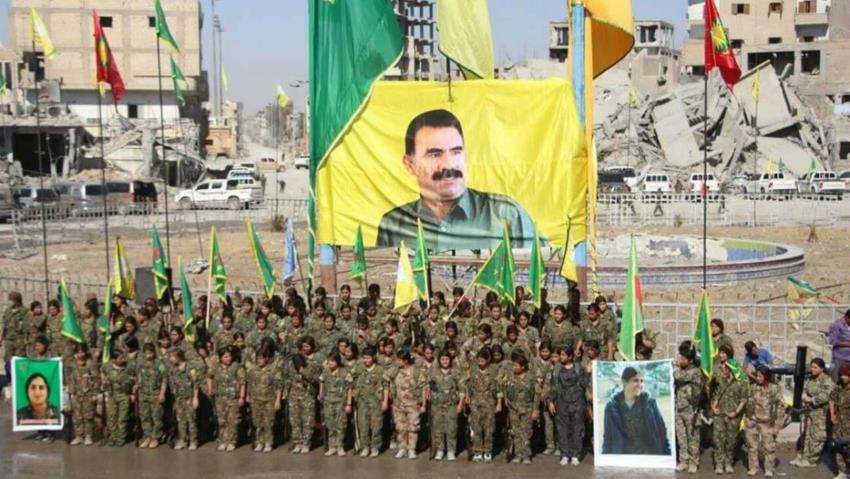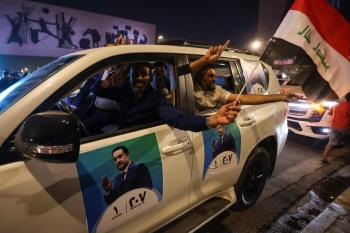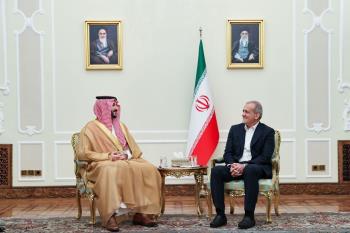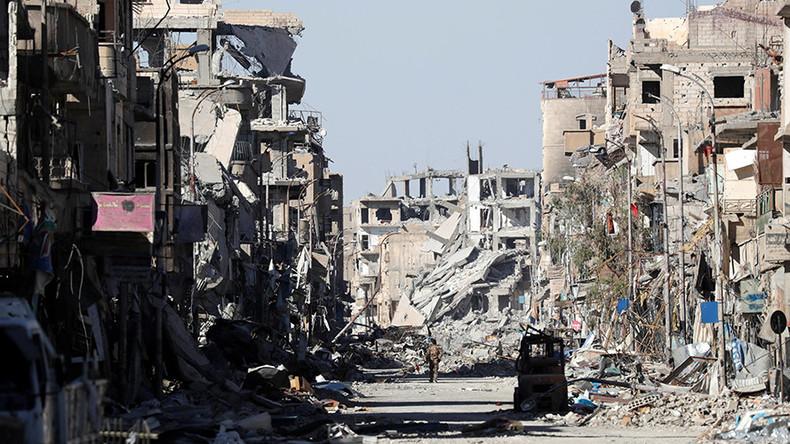The capture of Syria’s Raqqa by US-backed militias from jihadists came at the high cost of the virtual annihilation of the city itself. This victory, reminiscent of the one in Mosul, northern Iraq, could now pit the militias against the Syrian army.
Raqqa, the Syrian stronghold of the terrorist group Islamic State (IS, formerly ISIS/ISIL) has now been declared “liberated” by both the predominantly-Kurdish Syrian Democratic Forces (SDF) and their backers, the US. Last weekend several hundred IS fighters struck a deal with the SDF to take their family members and leave to IS-controlled parts of Deir ez-Zor governorate. Some foreign fighters reportedly stayed behind, refusing to surrender.
Emboldened by the strategic victory, the SDF took a chance to needle their enemy Turkey, when they paraded a unit of female Kurdish fighters in Raqqa’s al-Naim square against the background of a large banner of Kurdish leader Abdullah Ocalan. Considered a terrorist by Ankara, he is serving a life sentence in Turkey for his role in fueling Kurdish insurgency in the country.

Kurdish forces raise large banner of jailed PKK leader Abdullah Ocalan in iconic Raqqa square
The episode is just one symptom of a larger problem that players in Syria are facing now with the universally-acknowledged bad guys IS in retreat. They have conflicting agendas and so far have shown little intention to find a consensus for the future of Syria. Another example this week prompted a response from Moscow, when a spokesman for the Russian military had to reassure would-be American tourists in the rebel-held Idlib governorate of Syria that they would not be killed by Russian bombs while there.
"Russian warplanes in Syria do not target residential areas,” Major-General Igor Konashenkov said, commenting on a US-state travel advisory claiming the opposite. He added that this is what differentiates the Russian Air Force from the US-led coalition, which “has achieved an ‘outstanding victory’ in Raqqa by simply obliterating it".
No more Raqqa
The general’s dark sarcasm is based on grim facts on the ground. The Syrian city was taken after months of constant bombardment by coalition airstrikes and artillery shelling. The UN estimates that over 80 percent of the buildings in the city are now uninhabitable while reporters on the ground say literally not one of the houses was left unscathed in the fighting.
Pre-war, the city had some 220,000 residents. The Syrian violence caused mass migration, with tens of thousands arriving in Raqqa throughout the years, but under IS rule the city’s Kurdish minority was targeted with evictions and executions. Some 200,000 were estimated to still live there by the beginning of the siege in June.
Four months later, an overwhelming majority of the civilians had fled Raqqa, while some 1,800 to 1,900 were killed in the fighting. Coalition strikes accounted for at least 1,300 of those deaths, according to Airwars group, which records and verifies reports of deaths in Iraq and Syria. If the figure included the deaths since March, when the SDF started preparations for the siege, in would be above 2,000, higher than the estimated coalition kills during the capture of Mosul in Iraq, a city several times higher.
"It must be noted that in Mosul reports were often contradictory and attribution difficult, and therefore ‘likely’ Coalition incidents were proportionally fewer. In Raqqa, when a bomb or artillery shell fell it almost certainly originated with the Coalition,” the report noted.
The group’s estimate for the civilian death toll in Mosul was over 7,200 during the last phase of the operation, with between 900 and 1,200 people killed by coalition strikes rather than Iraqi forces or the jihadists. The number of people displaced in the Iraqi siege was almost 700,000, compared to 270,000 in the Raqqa operation.
The ruin left of Raqqa after the battle is rigged with explosives and requires extensive effort to make it safe again before any reconstruction may take place. Washington is willing to provide some of that, but the scope of the help would be limited, according to an AFP report.
"We're not here forever to fix everything. We have no money or desire to spend 20 years here demining the homes,” a US official involved in the civilian operations in Syria told the agency.
Annihilation strategy bears fruit
The high level of what is called “collateral damage” in military slang during the Raqqa operation is a direct result of the change of strategy by the Trump administration, believes Middle East consultant Dmitry Frolovsky. The Republican president demanded swift victories of the Pentagon and gave the DoD much leeway in choosing the means for them.
Defense Secretary James Mattis warned that the goal of “ISIS annihilation” would cause civilian casualties, and so it has.
"Calling this operation effective would have been a stretch, even though as the saying goes ‘winners can't be judged’. Raqqa was conquered, or liberated, if you will,” Frolovsky told RT, adding that the civilian death toll in the city was “extraordinarily high for an operation of this kind.”
The fact that the last stage of the offensive ended in an evacuation deal for IS fighters seems ironic, considering Washington’s stated goal to kill all of them. And even before Raqqa was besieged the jihadist group pulled out some of its forces, noted Frolovsky.
"Taking Raqqa so quickly was made possible not only through good coordination between the US and its allies, but also because IS withdrew part of its fighters and weapons beforehand and sent them to other parts of Syria, particularly Deir ez-Zor governorate,” he said.
With Raqqa captured, there is an increasing risk of the SDF clashing with the troops of the Syrian Army, which is trying to take back Deir ez-Zor governorate from IS, potentially pitting the foreign backers of the two, the US and Russia, against each other. There are some oil fields in the province and it also borders Iraq, making it important from a logistic standpoint.
A more distant problem is who would have the allegiance of the local government in Raqqa, a city that has historically been mostly Arab, not Kurdish. But at the moment Raqqa is pretty much uninhabited, and the SDF has the power to prevent Arab refugees from returning. This ‘de-Arabization’ tactic was reportedly used widely by Kurds in neighboring Iraq amid the rise of IS.
The US are likely trying to use their influence on the SDF to undermine the government in Damascus, Talat Masood, a retired Pakistani three-star general, told RT. The result would be “greater misery, more deaths and injuries among the Syrian people,” he predicted.
"If they had any problems with the Syrian government, they could have been dealt with in a different way, not by trying to create divisions within Syria and trying to split Syria into weak states that then can be manipulated,” he said.
Source: Russia Today



























